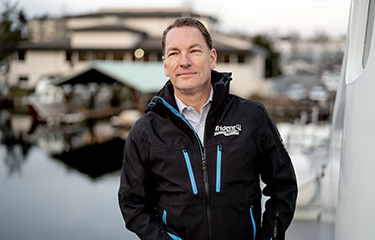Trident Seafoods is delaying the development and construction of a new processing plant in Unalaska, Alaska, U.S.A., citing an overall collapse of the seafood market.
The company first announced its plans to replace an aging seafood-processing plant in Akutan, Alaska, with a more modern facility in Unalaska in May 2022, telling SeafoodSource that construction on some items – such as the dock – was already underway. Since that time, however, the company said global market conditions and record harvests of several species are driving it to delay, but not cancel, its plans.
In the announcement that it was delaying construction of the Unalaska plant, Trident stated that it is delaying its original plans to break ground on the new facility in 2024 and will now break ground in 2025.
“With a projected three-year build plan, the new timeline means the plant would be operational no sooner than 2028,” Trident stated.
A “confluence” of high inventory levels and low demand, which has in turn driven down the price of most species, including pollock and salmon, is a primary factor in the delay.
The rapid price drop starkly contrasts market predictions for 2022, when supplies for species dropped, experts predicted strong demand for species like pollock, and prices reached highs for a wide number of seafood products.
“I’ve been in the industry a long time, and I’ve never seen markets like this,” Trident CEO Joe Bundrant said in a release. “The rate and pace at which markets are collapsing across our key species is staggering. Not only are global inventories and operating costs high, but demand is low; some are selling at or below cost just to generate cash.”
The price collapse for sockeye salmon, for example, was bad enough that Trident sent messages to its fishing fleets during the Bristol Bay sockeye season announcing the base price it would pay was less than half what it paid in 2022. The company said the glut of salmon in 2022 and drops in demand resulted in the company struggling to make money on its fish.
“The extent to which wholesale prices have fallen across all species is difficult to fathom and has been very challenging for the Alaskan seafood industry to absorb,” the company said in a message it sent to its fleet.
The existing Akutan facility is Trident’s largest facility in Alaska and operates year-round. This processing plant handles primary processing and freezing of Alaska pollock, Pacific cod, king crab, snow crab, halibut, and other species caught in the Bering Sea.
The plant, however, is aging and becoming less efficient – hence the company’s plans for a new facility.
“Our current plant in Akutan has served everyone well since the 1980s,” Trident Senior Vice President of Alaska Operations Jeff Welbourn said. “Wear and tear over the years and a remote and harsh environment make maintaining the plant for the long run no longer feasible. We’ve designed a next-generation processing plant to deliver the operating efficiencies and value our fishermen and markets deserve from Alaska’s world-class fisheries.”
The new plant, he added, will have state-of-the-art equipment and processing to reduce waste and extract more value from each fish.
Bundrant – whose father, Chuck Bundrant, founded Trident in 1973 – said the company will remain committed to operating in the region and serving independent harvesters.
“Trident has a long history of managing through good times and bad to return value to all our stakeholders while generating the cash needed to invest in the future,” he said. “Our fishermen need a fair return on their investment to sustain a healthy harvesting sector. We depend on them as much as they depend on us.”
The company called on the U.S. government to institute policies that would protect domestic seafood producers from cheaper imports. Alaska’s congressional delegation recently introduced legislation intended to close loopholes in U.S. rules banning Russian seafood imports, and other industry groups – such as the Southern Shrimp Alliance – have also made calls for greater scrutiny of foreign imports amid historically low prices.
“Current U.S. trade policy and domestic programs for seafood are failing domestic producers at this critical time,” Trident Executive Vice President of Public Affairs Stefanie Moreland said. “We cannot continue investing in the improvements necessary to modernize our sector when foreign supply chains with low regulatory standards and no meaningful oversight have equal or better positioning with respect to the tariff and non-tariff market barriers we face in global markets.”
Photo courtesy of Trident Seafoods







